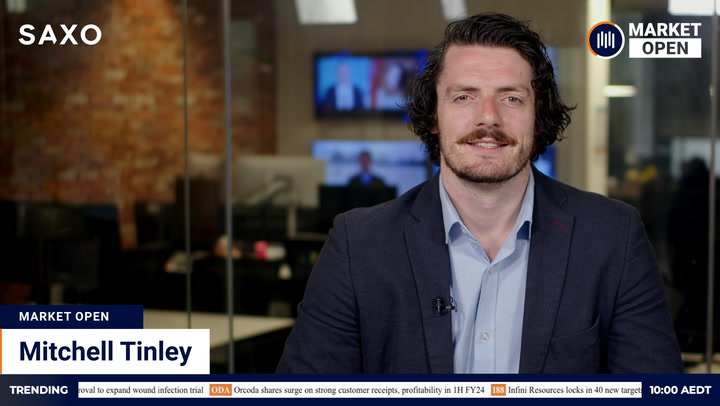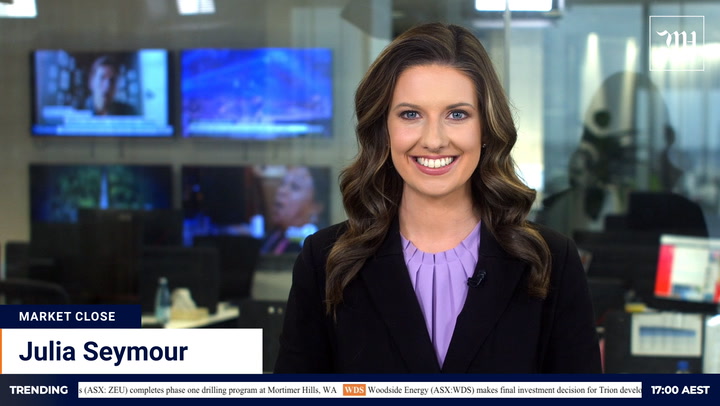The share market was poised for its weakest open in more than a year following two days of brutal selling in the US across the long weekend.
The S&P 500 tumbled almost 3.9 per cent into a bear market overnight as recession fears mounted. The fall added to a 2.9 per cent loss on Friday.
The ASX 200 was expected to be a sea of red today as markets adjust to the prospect global inflationary pressures have not yet peaked. ASX futures have fallen a combined 289 points or almost 4.2 per cent across the Queen’s Birthday weekend.
Cryptocurrencies suffered double-digit declines. The dollar skidded under 70 US cents. Iron ore and most metals retreated as China battled another Covid outbreak. Oil edged higher overnight for the first time in three sessions.
Wall Street
US stocks crumpled after Friday’s consumer price data dashed hopes inflation had peaked. Selling accelerated overnight after the Wall Street Journal reported the Federal Reserve may increase its target rate by 75 basis points tomorrow night.
The S&P 500 dived 151 points or 3.88 per cent. Coming on the back of Friday’s 2.91 per cent loss, the decline extended the benchmark’s fall since its January peak beyond 21 per cent.
The Dow Jones Industrial Average plunged almost 900 points for a second straight session. The blue-chip average shed 876 points or 2.79 per cent last night and 880 points or 2.73 per cent on Friday.
The Nasdaq Composite, already deep in bear market territory, fell 531 points or 4.68 per cent overnight and 414 points or 3.52 per cent on Friday.
“The market had been trying to rally around the idea that inflation has peaked, and the Fed would not have to be more aggressive,” Ross Mayfield, investment strategy analyst at Baird, told Reuters.
“That story fell apart on Friday with the CPI report, showing broad inflation being entrenched everywhere you look.”
Havens were non-existent. Bond markets sold off, driving the ten-year yield up 20 basis points, its biggest move since March 2020. Bitcoin and Ethereum fell more than 14 per cent. An index of gold miners dropped more than 6 per cent.
At one point overnight, every stock on the S&P 500 was in the red. Just five companies finished higher. The energy sector dropped more than 5 per cent even as crude prices rose.
“There’s nothing out there right now with valuations under question, with interest rates rising, the direction of the economy uncertain,” Jack Ablin, founding partner of Cresset Capital, told CNBC.
On the Dow, Boeing sank 8.77 per cent, Salesforce 6.96 per cent and AmEx 5.26 per cent. McDonald’s was the only one of the Average’s 30 companies to advance, gaining 0.46 per cent.
Travel stocks were hit particularly hard. Major cruise lines logged double-digit losses. United Airlines dropped 10.06 per cent. Casino groups also suffered heavy falls.
Tesla, Amazon and Facebook owner Meta Platforms all lost at least 5 per cent. Apple shed 3.83 per cent.
Major Asian markets suffered falls of up to 3.4 per cent yesterday. Japan’s Nikkei index shed 3.01 per cent, Hong Kong’s Hang Seng index 3.39 per cent and China’s Shanghai Composite 0.89 per cent.
Australian outlook
Anyone of a nervous disposition best look away. The holiday is well and truly over.
Investors are likely to see a significant chunk of their post-pandemic gains evaporate today. The S&P/ASX 200 looks likely to open near where it was back in March 2021.
“With Wall Street going down like Covid at a gathering, be prepared for the ASX 200 to open a lot closer to 6,750 than 7,000,” City Index senior market analyst Matt Simpson said.
“This is de-risking at its finest. Investors are rushing for the same small exit in hope of offloading their plummeting assets for cash,” he added.
The recent narrative that global inflationary pressures had peaked was exposed as a chimera on Friday. Markets are now adjusting to the risk central banks will raise rates so high, so quickly, that economies fall into recession.
“Inflation isn’t near its peak levels, and unfortunately, there is a lot more of these soaring numbers to come. Traders and investors are concerned as recession odds are only increasing with every day passing,” Naeem Aslam, chief market analyst at AVATrade, said.
“Higher inflation has become an emotional matter now for consumers as it has started to seriously erode their disposable income. Consumers are constantly being pushed in a corner, and higher inflation is making them to make difficult choices.”
The dollar has been crushed by a flight to the perceived safety of the greenback. The Aussie went into the long weekend near 71 US cents and was this morning down 1.35 per cent at 69.24 US cents.
Wall Street offered no obvious havens overnight, but defensive sectors fared slightly better (or less worse). Sector losses ranged from 2.18 per cent (consumer staples) up to 5.13 per cent (energy). Financials shed 2.95 per cent. Materials lost 3.92 per cent.
Turning to the week ahead, the week’s big-ticket item on the domestic economic calendar is Thursday’s May employment report. Economists expect the jobless rate to tick down to 3.8 per cent from 3.9 per cent the previous month as the economy added around 25,000 jobs.
The rest of the week looks like this: business confidence, household spending (today); and weekly and monthly consumer sentiment (Wednesday).
China releases factory and retail data tomorrow.
The US Federal Reserve meets this week and will increase the Fed Funds Rate by at least 50 basis points tomorrow night. Markets shuddered overnight at the risk the Fed may go even harder with a 75 point increase.
Wall Street has wholesale inflation data tonight, retail sales tomorrow and a speech by Fed Chair Jerome Powell on Friday to look forward to.
IPOs: the week’s only listing takes place at 11 am AEST today. Kingsland Minerals has copper, uranium and gold prospects in the Northern Territory, and a nickel and cobalt project in WA.
Commodities
Commodity prices wilted as rising borrowing costs, dollar strength and increased Covid cases in China undermined buying interest.
“There had been genuinely optimistic hope that Chinese authorities might refrain from reversing back into economically crippling lockdowns, but that hope is now crumbling before us,” Atilla Widnell, managing director at Navigate Commodities in Singapore, said.
Spot iron ore prices fell back under US$140 a tonne. The spot price for ore landed at Tianjin fell US$2.84 or 2 per cent to US$139.53 a tonne.
Aluminium slumped to a six-month low. Benchmark aluminium on the London Metal Exchange dropped 2.2 per cent to US$2,602.50 a tonne. Copper sank 1.7 per cent, nickel 5 per cent, lead 2.6 per cent, zinc 2.1 per cent and tin 6.7 per cent.
“Metals outlook in the near term is likely to remain under pressure. The Chinese market is heading to a traditionally soft period in the coming weeks, on top of new threats of lockdowns and a sluggish economy,” Paul Adkins of AZ Global Consulting, told Reuters.
Gold logged its weakest close in three weeks, dashing hopes it might provide a haven from wider market turmoil. Metal for August delivery settled US$43.70 or 2.3 per cent lower at US$1,831.80 an ounce. The NYSE Arca Gold Bugs Index shed 6.42 per cent.
“In a sweeping financial drop like this, it’s rare for gold not to get caught in a short-term sell-off at some stage,” Adrian Ash, director of research at BullionVault, told MarketWatch. “The question now… is when gold’s appeal as a crisis hedge will reassert itself.”
Oil bagged its first advance in three sessions in volatile trade. Brent crude settled 26 US cents or 0.2 per cent ahead at US$122.27 a barrel after trading as low as US$118.93.
BHP‘s US-traded depositary receipts added to Friday’s 2.76 per cent fall with an overnight loss of 4.21 per cent. The Big Australian’s UK stock dropped 2.81 per cent on Friday and 2.15 per cent overnight.
Rio Tinto shed 4.02 per cent in the US overnight and 1.93 per cent in the UK. On Friday, the miner gave up 3.66 per cent in the States and 3.56 per cent in the UK.





